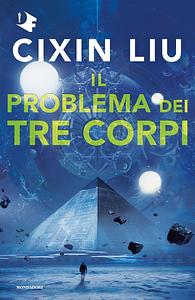Take a photo of a barcode or cover
challenging
slow-paced
Plot or Character Driven:
A mix
Strong character development:
Complicated
Loveable characters:
No
Diverse cast of characters:
Yes
Flaws of characters a main focus:
Complicated
I found this book difficult to follow
A promising start with a substantially less promising finish. Overall I was disappointed.
Let me start by saying, I think it's possible that some of the gripes I have with this book could be due to translation, or cultural differences, but I did my best not to let that impact my review. Also, I don't want to downplay the cultural importance of this book; it has allegedly popularized the genre in China, which is extremely valuable in its own right.
For a book that bills itself as "Hard science fiction", and begins in a way that would imply that. Now and again I ran into passages that defied the conventional "hard scifi" genre, but the characters seemed disturbed by these breaks with science as well, and that actually pulled me in more. Unfortunately, this takes a turn for the worse about 75% of the way through the book. If you've ever taken a university class in quantum mechanics, the science in the latter quarter of this book will be immediately apparent as laughably bad. If not, the things that Liu Cixin writes may be indecipherable from the rest of the semi-realistic technical jargon. However, the last 50 pages will likely shatter the illusion for anyone, regardless of familiarity with physics.
When you dig yourself into a hole like that, there's no way to dig yourself out without a little bit of good ol' space magic. Bad science doesn't spell the death of a scifi story. In fact, the majority of "hard scifi" novels have their moments. What bothers me is that it feels like Liu Cixin wrote his way into a corner trying to preserve the realism, and then when he realized he couldn't fix it while maintaining those rules, broke them rather than rewrite earlier portions. It feels hasty, and the last 1/4 of the book feel terribly disjointed from the rest.
Additionally, dialog is extremely strange in this book. This may be an artifact of the translation, or even a cultural difference, but it seemed very apparent. Characters tell stories about their past in first person, but the tone is indistinguishable from the expository prose of the author. The way characters describe their past is totally unbelievable. A character describing a traumatic event in their past might stop to use flowery simile to describe the clouds, or dew on a flower petal. Details that are completely irrelevant to the story. Liu Cixin must be aware of this to some degree, because he goes out of his way to have characters explain why being so long winded isn't an issue in this circumstance, or ask if it's ok that they're taking so long.
This was an ambitious book, and the message was interesting and good, but I truly don't understand how it came to be compared with some of the best of the genre. The story was not cohesive, and the dialog was really jarring. If you're already interested in reading this, I don't know that I'd discourage you, but I think that there are so many better options to top your to-read list.
Let me start by saying, I think it's possible that some of the gripes I have with this book could be due to translation, or cultural differences, but I did my best not to let that impact my review. Also, I don't want to downplay the cultural importance of this book; it has allegedly popularized the genre in China, which is extremely valuable in its own right.
For a book that bills itself as "Hard science fiction", and begins in a way that would imply that. Now and again I ran into passages that defied the conventional "hard scifi" genre, but the characters seemed disturbed by these breaks with science as well, and that actually pulled me in more. Unfortunately, this takes a turn for the worse about 75% of the way through the book. If you've ever taken a university class in quantum mechanics, the science in the latter quarter of this book will be immediately apparent as laughably bad. If not, the things that Liu Cixin writes may be indecipherable from the rest of the semi-realistic technical jargon. However, the last 50 pages will likely shatter the illusion for anyone, regardless of familiarity with physics.
When you dig yourself into a hole like that, there's no way to dig yourself out without a little bit of good ol' space magic. Bad science doesn't spell the death of a scifi story. In fact, the majority of "hard scifi" novels have their moments. What bothers me is that it feels like Liu Cixin wrote his way into a corner trying to preserve the realism, and then when he realized he couldn't fix it while maintaining those rules, broke them rather than rewrite earlier portions. It feels hasty, and the last 1/4 of the book feel terribly disjointed from the rest.
Additionally, dialog is extremely strange in this book. This may be an artifact of the translation, or even a cultural difference, but it seemed very apparent. Characters tell stories about their past in first person, but the tone is indistinguishable from the expository prose of the author. The way characters describe their past is totally unbelievable. A character describing a traumatic event in their past might stop to use flowery simile to describe the clouds, or dew on a flower petal. Details that are completely irrelevant to the story. Liu Cixin must be aware of this to some degree, because he goes out of his way to have characters explain why being so long winded isn't an issue in this circumstance, or ask if it's ok that they're taking so long.
This was an ambitious book, and the message was interesting and good, but I truly don't understand how it came to be compared with some of the best of the genre. The story was not cohesive, and the dialog was really jarring. If you're already interested in reading this, I don't know that I'd discourage you, but I think that there are so many better options to top your to-read list.
Very engaging and thought provoking, science just-barely-fiction. No plasma torpedos here, just a lot of theoretical physics, sociology, and one big "what-if" question.
So happy there's a sequel!
So happy there's a sequel!
Bit of a slog, and then went way over my head, but an interesting story ... I think?
Set against the backdrop of modern China and Cultural Revolution, a decade-long sociopolitical struggle in China, The Three-Body Problem by Cixin Liu looks into humanity’s choices and their far-reaching consequences. As mentioned by Liu in the afterword, our compassion and kindness should be directed inward—towards humanity—rather than outward towards the stars or extraterrestrial life. Even though humanity often appears hopeless and irredeemable, as exemplified by one character’s profound resentment stemming from the violence and betrayal of the Cultural Revolution, these narratives urges us to confront these flaws.
Liu’s engineering background as well as his fascination with stars and light-years craft a captivating story with an impressive blend of hard science, history, philosophy, and boundless imagination. Cixin Liu highlights humanity’s use of science as both a tool for advancement and a weapon for dominance. Liu reframes humanity’s place in the universe through the lens of our own ingenuity by compellingly illustrates how extraterrestrial life fears our scientific progress, recognizing science's potential to challenge even the mightiest threats. That being said, he emphasizes that science is not only pivotal for innovation but also serve as a critical tool for defense and offense.
Liu’s masterful use of the "bugs" metaphor—how human beings are mere bugs to aliens is a nod to how we might seem insignificant to greater forces. But bugs are never truly defeated, are they? How Liu drops the analogy at the end is jaw-dropping and left me in awe. It makes me eagerly anticipate the sequels to uncover how Liu continues to explore the theme of human resilience.
While the scientific and philosophical layers are undeniably engaging, the narrative occasionally demands patience. It can feel dense, but perseverance is rewarded with moments of awe and intellectual stimulation. The moral ambiguity and the questions Liu pose about humanity’s survival make this an unforgettable read. I look forward to exploring the rest of the trilogy.
Liu’s engineering background as well as his fascination with stars and light-years craft a captivating story with an impressive blend of hard science, history, philosophy, and boundless imagination. Cixin Liu highlights humanity’s use of science as both a tool for advancement and a weapon for dominance. Liu reframes humanity’s place in the universe through the lens of our own ingenuity by compellingly illustrates how extraterrestrial life fears our scientific progress, recognizing science's potential to challenge even the mightiest threats. That being said, he emphasizes that science is not only pivotal for innovation but also serve as a critical tool for defense and offense.
Liu’s masterful use of the "bugs" metaphor—how human beings are mere bugs to aliens is a nod to how we might seem insignificant to greater forces. But bugs are never truly defeated, are they? How Liu drops the analogy at the end is jaw-dropping and left me in awe. It makes me eagerly anticipate the sequels to uncover how Liu continues to explore the theme of human resilience.
While the scientific and philosophical layers are undeniably engaging, the narrative occasionally demands patience. It can feel dense, but perseverance is rewarded with moments of awe and intellectual stimulation. The moral ambiguity and the questions Liu pose about humanity’s survival make this an unforgettable read. I look forward to exploring the rest of the trilogy.
challenging
dark
mysterious
slow-paced
Plot or Character Driven:
Plot
Strong character development:
No
I just... I don't understand anything that's going on.
Content warning: physics!
Content warning: physics!
mysterious
reflective
tense
medium-paced
Plot or Character Driven:
A mix
Strong character development:
No
Loveable characters:
Complicated
Diverse cast of characters:
Complicated
Flaws of characters a main focus:
No
adventurous
reflective
medium-paced
Plot or Character Driven:
Character
Strong character development:
Yes
Loveable characters:
Complicated
Diverse cast of characters:
Yes
Flaws of characters a main focus:
Yes
challenging
informative
mysterious
slow-paced
Plot or Character Driven:
Plot
Strong character development:
Complicated
Loveable characters:
Complicated
Diverse cast of characters:
No
Flaws of characters a main focus:
No




